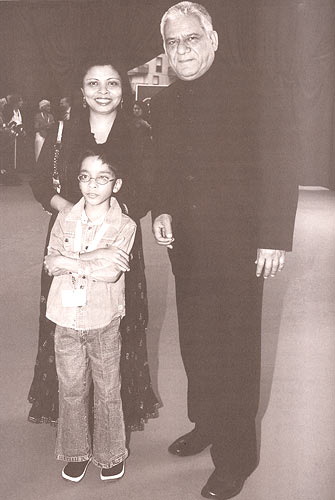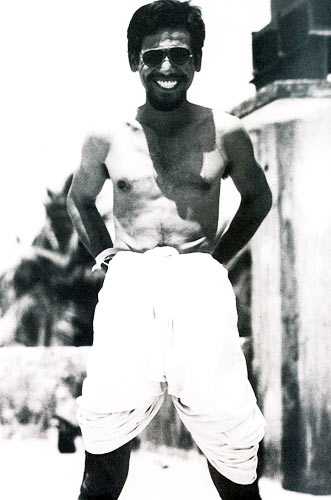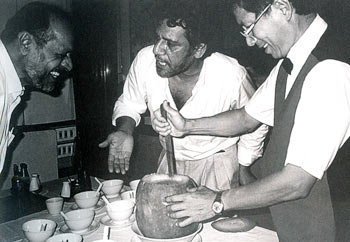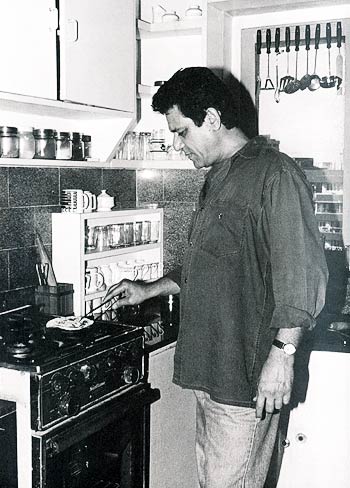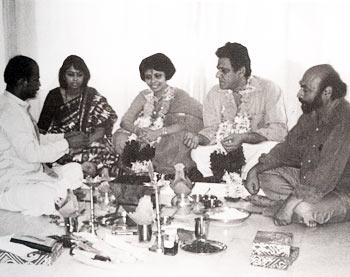 | « Back to article | Print this article |
'Om Puri did not get upset with the biography'
Om Puri's biography Unlikely Hero has kicked up a storm even before it hit the stores. The book, written by his wife Nandita Puri, supposedly details the veteran actor's early relationships. The actor initially blamed his wife publicly for creating a controversy. Later, he apologised to her and son Ishaan.
Nandita tells Patcy N exactly what her book is about.
Is it true that Om Puri wanted someone else to write this biography but you insisted on writing it yourself? Did you feel you would be able to handle such a responsibility?
No, that is not true. I was supposed to write this book when I first met him in 1993. I had gone to interview him during (the making of) City of Joy. We weren't married then. But it did not work out. In 2002, I signed a contract with Roli Books to write Om Puri's biography.
This is my husband's biography, not Nandita's version of Om Puri. So it had to come out well. I started gathering everything on him slowly. In 2005, I published my book of short stories called Nine On Nine and after that, started work on my novel. By then, Om got upset with me and he asked me if he should ask someone else to write it.
A friend of mine, Dr Shozeb Haider, who had helped me with the research, told me that it would be a shame if anyone else wrote Om's biography since I had everything at my disposal. He said I was being lazy. That really spurred me on. I finished the book in a year and a half then.
What attracted you to Om Puri's life?
Many people have rags-to-riches stories. But every story is different, every incident is different. Om's story is not only a rags-to-riches one but he is someone who has really achieved something. He has been at the forefront of parallel cinema along with Shabana Azmi, Smita Patil and Naseeruddin Shah. No one has written about these people till date. Only Smita Patil has some Marathi biographies.
So I wanted to write the whole journey, how he achieved it all. This is a story that will inspire people.
Did you think you would do a better job than any other biographer?
Yes and no. I thought I would do a better job than any other biographer in India because I have been writing for 20 years now and am trained. Also, I know the subject very well.
Derek Malcolm (film critic, formerly with The Guardian) has written an introduction in the biography. From that, you can see that the man's knowledge about cinema is so vast and deep that I could never have written it better.
If a senior film writer was writing the biography, he or she would have done a better job because of their knowledge on cinema. But they would not have been able to capture Om Puri, the human being, the man at home.
'He was not evasive but he can be moody'
What kind of research has gone into writing the book?
It has been 18 years of research -- from the time I met him.
I contacted all his colleagues. I spoke to directors like Shyam Benegal, Govind Nihalini, Ketan Mehta, Saeed Mirza, Priyadarshan and Kamal Haasan and his friends Naseer and Shabana Azmi. His colleague Patrick Swayze has written a foreword to the book. I also spoke to Ben Kingsley, (Gandhi director) Richard Attenborough, Tom Hanks, Jack Nicholson, (Charlie Wilson's War director) Mike Nichols and (City Of Joy director) Dominique Lapierre. I spoke to family and friends as well.
I have been on the sets of Om's movies, from City Of Joy, Chachi 420, Hera Pheri, Wolf... His producers and directors have become friends with me. I have an overview of all the events in his life. If Tom Hanks said something about him, a biographer would just have that one paragraph. But I would know what happened beyond that -- I would know that we went out for dinner that day, and even what we ordered!
Was everything on Mr Puri easily available?
Some parts were easy, some parts were tough. The most difficult thing was to get contacts of people like Ben Kingsley and Richard Attenborough.
How did you go about writing the book?
I wanted it to be a proper story from his childhood, his school and college days. Then it would move on to the National School of Drama because that was a very important part of Om's life, when he met Naseer and Shabana. At the Film and Television Institute of India, he made friends with David Dhawan, Suresh Oberoi, Tom Alter, Benjamin Gilani and Rakesh Bedi. After that, the struggle in Mumbai and the parallel cinema movement -- films like Ardh Satya, Aakrosh and Tamas. And then the shift to commercial cinema and British cinema.
Did you interview Mr Puri as if you were a journalist? How many such interview sessions did you have?
Yes. The interview sessions took many days. I would sit with him for a few days and then he would go off on shoots and then we would start the next session again.
How did they go?
They went off well as Om loves talking. He loves talking about his childhood.
Was he difficult to interview? Was he frank? Was he evasive?
He was not evasive but he can be moody. If he was in a bad mood or if we had a squabble, he would not talk all day. But when he talks, he's very frank and honest.
'He was fine with the chapter on his relationships'
When you spoke to people like Shyam Benegal, what stories did you get from them?
I got wonderful stories from his friends. They would tell me about his girlfriends. If I didn't know about that girl, they would say, 'oh if he didn't tell you, I'm not telling you.' It was all in fun. They also spoke seriously about him as an actor.
I wanted the biography to be a fun read. When you write about someone's childhood, it's always fun. But when you write about their work, it becomes boring. That's why I made Om talk about his films in first person.
Did you show the book in progress to Mr Puri? Did you discuss it with him when you were writing it?
I did not show him the book when it was in progress. I showed it to him after it was done. He was keen on reading the chapters on his childhood, and his relationships with the women in his life. He did not want to be misquoted.
He was fine with the chapter on his relationships but complained that some childhood incidents were edited out. Some of those incidents were added later.
Was he curious about what you were writing?
Not really because he knew more or less I would follow what he had told me and incorporate it properly.
How much of his life did you know already and how much did you come to know during the research for the book?
I knew 80 to 85 percent of his life before writing the book. Twenty percent was an eye-opener when others were talking about him.
What was the most pleasant thing that you discovered about his life? What was new about his life for you?
When his colleague and actors like Ben Kingsley spoke about him with such high regard. Ben Kingsley just said three sentences but they were very meaningful. That's when you realise Om Puri must be really very good. As a husband, you take him for granted but when actors and filmmakers of international repute talk about him, you realise that he must be very good at his work.
'He is very proud of the book'
What was the most unexpected thing that you discovered about him?
Nothing really. I knew most of the things in his life. In fact, I had taken some of his childhood incidents in my book of short stories. Instead of him, I based the stories on a girl.
Maybe I was shocked when I first learnt of his relationships. But that was about 15 years ago. For me, the stories are old. It's new for the media.
What are the most interesting details in the book?
His childhood, and his poverty. He worked in a tea-stall when he was eight years old. He would wash vessels and earn money. That money would go into the family kitty for food. My son Ishaan is 11 years old now, and has a good life. At his age, his father was working and studying as well.
Which is your favourite story in the book?
When I met him. But then I enjoyed reading about the way the films were shot. Like Jaane Bhi Do Yaaron. I enjoyed reading about his experiences with his co-stars. I enjoyed the film trivia.
Now that the book is complete, do you think his entire life has been covered or have you left out something?
I think his life has been covered in a very crisp and readable manner. What has been left out was irrelevant.
Why did Mr Puri get upset with the book? Had he not read it earlier?
He did not get upset with the book. He got upset with two passages, leaked by Tehelka. Tehelka printed those passages without my permission and Om was upset because he said my life is not only that. Plus, the whole thing was blown out of proportion by NDTV's Barkha Dutt. She kept saying the book was about Om Puri's sex life. Om said that his story was about his work, his journey and his struggle.
He was upset that a few paragraphs were blown out of proportion. He is very proud of the book.
'Om had asked me to mention Shanti and Laxmi in his book'
Had he asked you not to add the Shanti and Laxmi parts in the book?
He had asked me to mention it in the book but now feels that his life was only about Shanti and Laxmi. The Mumbai Mirror interview was blown out of proportion. It said that I wrote 'lurid gossip'. But he told me that he did not know the meaning of 'lurid'.
Om was upset with the way Tehelka and Barkha Dutt blew up the whole thing. He was very upset with my publisher for leaking the stuff. Initially, he thought that I had leaked out this information. But later, he realised it wasn't me. All this happened when he was in Chandigarh and I was in Mumbai.
Now we don't want to talk about the controversy. At the end of the day, it is a respectable publishing house, I am a writer with lots of credibility and my husband is the most dignified and respected actor in the world. So we cannot have a book with anything other than dignity.
What was his reaction after reading the book?
He has started reading the book now and is enjoying it.
One of the nicest biographies that I have read is Protima Bedi's Timepass: The Memoirs of Protima Bedi. When Om read it, he loved it. He said that he hoped his biography would be like that -- honest, interesting and fun.
What has your son's reaction been to this most unusual exercise -- of a wife writing her husband's autobiography?
My son has always told me that I should be the one to write Om's biography because I am a writer. He was very keen about that and kept pushing me to write. In fact, he has written a two-page essay about his father in the book, and drawn a cartoon of his father.
Has this book shaken the foundation of your marriage?
No, not at all. It is just got us into the limelight, and gave us publicity we are not used to. It has given the book a lot of free publicity. Everything is fine between us.
Where does Nandita Puri go from here?
I am writing another novel called Two Worlds. Everybody is worried about two paragraphs in Om Puri's book but when they read this novel, the whole middle class morality will be shaken. It has a lot of inside information about Bollywood and the media. It talks about Mumbai politics and the underworld.
